
Month: January 2009
Film: Role Models (2008)
 Paul Rudd and Seann William Scott are the employees of the Minotaur energy drinks company, driving round the country promoting the drink as a safe alternative to drugs (despite it turning your pee green). That is until Danny (Rudd) has an overly shitty day, and having been dumped by his lawyer girlfriend (Elizabeth Banks) immediately after he proposes to her, he gets into a fight with school security on one of the talks and is given the alternative of community service or face jail.
Paul Rudd and Seann William Scott are the employees of the Minotaur energy drinks company, driving round the country promoting the drink as a safe alternative to drugs (despite it turning your pee green). That is until Danny (Rudd) has an overly shitty day, and having been dumped by his lawyer girlfriend (Elizabeth Banks) immediately after he proposes to her, he gets into a fight with school security on one of the talks and is given the alternative of community service or face jail.When they are enlisted to help with the Sturdy Wings group as mentors to a couple of troubled kids things go from bad to worse. Wheeler’s (Scott) kid is a foul-mouthed boob obsessed urchin Ronnie (Bobb’e J Thompson) and Danny with the intraverted teenager Augie (Christopher Mintz-Plasse) who lives his entire life through fantasy role playing….
Ahh, the American sex comedy… where would we be without you?
Role Models is the latest offering in the genre, though quite who its audience is, is hard to place. The kids are 11 and 18 and the adults in their 30s… its a good mix which ultimately shifts it away from being a simple teen sex comedy based around highschool environments. Bobb’e Thompson shines out with his direct delivery, which has a way of taking you by surprise – should a kid have a mouth like that?! He also, frankly gets some of the best lines.
There’s some nice messages in the film – not too cheesy, and played well within the context of the screwed up families, absent/unsupportive parents and escapism through role play. Heart-warming but also very very funny, and rather caustic too! Ah, go on…
Film: Valkyrie (2008)

Britcom: The Magnificent Evans (1984)
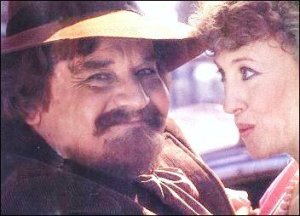 The late Ronnie Barker is never less than watchable, and at his best he is absolutely brilliant. This 1984 BBC sitcom showcases Barker’s larger than life personality as the Welsh photographic artist Plantagenet Evans.
The late Ronnie Barker is never less than watchable, and at his best he is absolutely brilliant. This 1984 BBC sitcom showcases Barker’s larger than life personality as the Welsh photographic artist Plantagenet Evans.He believes himself to be a great artist, and has little time for the imperfections that everyday life and the average person brings his way, whether it be a bride with a big nose or an aspiring academic with a hump. Tact is something he lacks, and he is quick to point out the failings of others and has an uncanny ability to tease out the hidden truth between other’s relationships.
Despite these less than perfect traits, Evans is something of a loveable rogue, and this perhaps is the result of the perspective of the narration. Roy Clarke (perhaps best known for penning Open All Hours and the never-ending Last of the Summer Wine) presents the series as scenes from the memoirs of Evan’s live-in assistant Rachel (Sharon Morgan). Rachel reads from her personal journal (a touch of those classic romance novels here…) as she works for Evans and battles for his eternal affection. Despite living with him (she has her own appartment!) in sin, and his promises, he refuses to give in and marry her – instead leaving her hanging. He believes its better for business to be seen to be single…
A chunk of the comedy is (typically for the mid-80s) centred on their illicit relationship and the cheeky inappropriateness of it. Each episode showcases Sharon Morgan’s black-stocking clad legs as she climbs in and out of Evan’s jalopy, whilst he gazes on admiringly. Meanwhile, Rachel’s sister and brother in law peer through their net curtains across the street with disapproving eyes and attempt to take her away from the dark side.
The show only lasted one series, so never quite finds the proper stride. Whilst not up amongst his most favored creations, Barker is engaging and plays the Welshman well. Oh, if only life were that simple and we could all just say what we think to potential clients! Though of course, some sense of reality creeps in as his photography obviously doesn’t make enough money and he has to do a side in antique dealing and retail of Sweedish wood-burning stoves (which also gives him an air of Arthur Dailey or Del Trotter as opposed to the flamboyant artist Evan’s obviously aspires to be).
Buy The Magnificent Evans on dvd here
Buy The Magnificent Evans as part of the Ultimate Ronnie Barker Collection dvd box set here
Novel: "Loser’s Town" by Daniel Depp (2009)
Let’s get some of the basics out of the way first, Depp is Johnny Depp’s brother, and has worked as a producer with him on features. Undoubtedly he has a good working knowledge of the film industry, which serves as a sort of research for the world in which he sets his prose. There’s a lot of buzz about Loser’s Town in the industry, with publishers falling over themselves for the rights to this book. Now whilst some of that is no doubt to do with the association with the other Depp, the book itself is actually rather good. Now, I’m not an agent and I don’t think I could adequately judge the marketplace, so my comments are based purely on my personal experience as a reader. Fair enough?
Loser’s Town is the first in a proposed series of novels featuring ex-stuntman David Spandau – a private detective working in LA. According to the publishers he is “a laconic private eye in the best tradition of Philip Marlowe and Sam Spade”. Well, I’ve never read either, so I can’t comment.
Spandau finds himself wraped up in a world of gangsters and mafiosa working within the film industry after agreeing to help new star Bobby Dye, an actor with lots of ambition and little sense. Dye is being blackmailed into appearing in a film which will counteract the chance of success created by his latest blockbuster production. With bodies to be accounted for, a drug-running operation to avoid, and an ex-wife on his mind, Spandau has more than his hands full…
One thing’s for sure, I wouldn’t be surprised if Depp’s book gets picked up for film adaptation soon, as its a remarkably cinematic work. There’s enough characters and some nicely vivid descriptions to make the whole thing very attractive. The swift move from calm conversation and serenity to rampant sex or gruesome violence works well and is perhaps a more realistic depiction of life.
Opening on a clumsy clean-up following an accidental heroin overdose at Dye’s home, I’m tempted to think of scenes in Pulp Fiction or Eyes Wide Shut but this is merely the preamble. We are all aware now, I think, of the deep set levels of corruption and malpractice in Hollywood, and Depp brings these to the fore. Constantly the image of the movies as a place of glamour is shown to be a construct of marketing and the cameras, and the truth is infinately less pleasant. We’re left to wonder how much of these comes through Depp’s own experiences and whether he is as disenchanted by the whole thing as Spandau seems to be.
Spandau’s position as a former stuntman gives him years of experience of the bullshit of the film industry and so allows him to move in and out of encounters without being bowled over by the sparkle and propeganda perpetrated by the studios. He’s someone who has been through the system and spat out, and survived. But despite this seemingly impenetrable exterior, Spandau is vulnerable, not least with regards to his ex-wife Dee (now moving on, despite a deep mutual attraction remaining). As this is a series we can only hope that the battle with Dee is expounded on further – for it makes him a three-dimensional character.
Interesting asides come in the form of Potts – the henchman with a brain and a heart. The two facets of his life are displayed like those moments from the Austin Powers films when we cut to the family of the henchman who has just been killed by Powers… And then there’s Terry, the Irish hired help. That a great chunk of the novel follows Terry’s investigation is actually an asset. Depp gives us characters we can’t help but care about, and he allows them their moment to breathe and to step into the spotlight. A diplomatic author indeed.
Loser’s Town rattles along at a fair pace, and is near-impossible to put down. It offers enough cliff-hangers and moments of build to bring you back again and again. Whilst for me, it started a little slow, and perhaps a little too predictably, Depp soon finds his voice and his path. Only the rapid (but perhaps apt) conclusion to the story frustrated me.
Depp has promise as a novelist, and Spandau has plenty of life left in him. This is good detective fiction which doesn’t depend on the minutae of clues. Like Spandau we have to find our way, and this is more detecting by active experience than remembered deduction.
Loser’s Town is published 2 March 2009 by Simon and Schuster in the UK and USA.
Buy Loser’s Town in the UK here
Buy Loser’s Town in the US here
Sherlock Holmes: Jeremy Brett
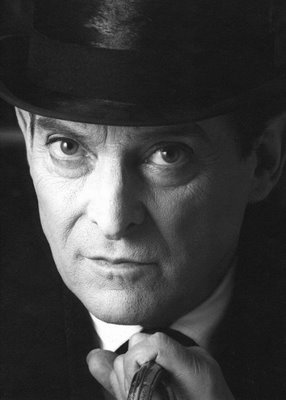
(a quick reminder of my challenge, and the current tally of entries)
1. 9 different interpretations of Sherlock Holmes 1 down, 8 to go
2. 9 instalments of “Avalard’s Box of Obfuscation” podcast 0 down, 9 to go
3. 9 novels 2 down, 7 to go
4. 9 Hitchcock films 0 down, 9 to go
5. 9 films at the cinema 3 down, 6 to go
6. 9 Michael Caine films 0 down, 9 to go
7. 9 classic Britcom television series 0 down, 9 to go
8. 9 British horror films 0 down, 9 to go
9. 9 episodes of the Avengers 0 down, 9 to go
When the challenge is through?
It occurs to me today, that I should be able to get through some of the categories in the 999 Challenge fairly quickly. With several novels and films down already, I could well be finished by April on those, and most of the others before the start of the summer. So what do I do with this blog then?
Film: Bride Wars (2009)
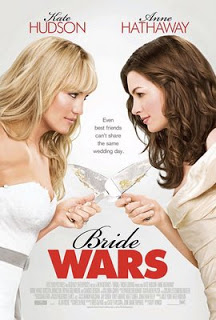
(a quick reminder of my challenge, and the current tally of entries)
1. 9 different interpretations of Sherlock Holmes
2. 9 instalments of “Avalard’s Box of Obfuscation” podcast
3. 9 novels 2 down, 7 to go
4. 9 Hitchcock films
5. 9 films at the cinema 3 down, 6 to go
6. 9 Michael Caine films
7. 9 classic Britcom television series
8. 9 British horror films
9. 9 episodes of the Avengers
Novel: "Moon" by James Herbert (1985)
At any rate, I was always aware of his collection of James Herbert novels, and I knew nothing other than he thought that Herbert’s The Fog was rather good, and that Herbert’s novels were horror stories. At this point I should say to my shame, I’ve yet to read any Lovecraft, King or Barker either something which I intend to correct.
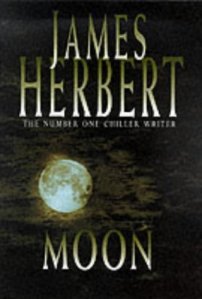 Anyway, in November 2007 I was one of the guests at Ingrid Pitt’s birthday party (which double’s up as a fan club bash) at which the guest of honour was none other than James Herbert himself. Having not read any of his books I didn’t feel I could speak to him (something which I once had to do with another author, making for a rotten experience), but I was intrigued and figuring our paths may cross again I made a note to try and read at least something of his in the near future. As an aside, Ingrid herself blogged about that event here.
Anyway, in November 2007 I was one of the guests at Ingrid Pitt’s birthday party (which double’s up as a fan club bash) at which the guest of honour was none other than James Herbert himself. Having not read any of his books I didn’t feel I could speak to him (something which I once had to do with another author, making for a rotten experience), but I was intrigued and figuring our paths may cross again I made a note to try and read at least something of his in the near future. As an aside, Ingrid herself blogged about that event here.
Cut to last summer.
By chance I happened to spot a copy of The Fog in a local discount booksellers (Bargain Books) for 50p, and so quickly devoured it. Whilst visiting Jonny in Edinburgh I picked up The Rats and Fluke in a second hand book store, and from there was hooked. Since then, I’ve read Lair, Shrine, The Survivor, ’48, The Spear and his most recent offering The Secret of Crickley Hall (which I got in a nice limited signed edition to add to my collection of signed books).
On face value, you pretty much know what you’re going to get with any of Herbert’s supernatural/horror stories. A male protagonist who uncovers something mysterious (often either directly involving himself or something he finds himself sucked into). At some point there will be an intense sexual encounter with a woman (usually a chapter’s worth of description here) and a resolution which reveals some greater truth about the protagonist and a tidying up of most of the loose ends. His men are damaged in some way – suffering often from the pain of a previous relationship, and Moon fills that brief admirably.
Regardless of what happens and how it turns out, there is something deeply satisfying about Herbert’s prose. This isn’t the pulp of someone like Dan Brown, who gives us very literally the identical plot in each of his books. But rather there is something familiar in the tale, which Herbert expands upon. Despite surface similarities each of the novels is deeply original.
Moon centres on a man who has latent psychic abilities which allow him to connect with the perpetrator of a deeply sadistic series of muders. He is reluctant to become involved with the police again following his experiences three years previously where he was implicated in a similar case. He teaches computers at a private girl’s school on the island (Jersey I think…) he moved to after the trauma of the past, and is involved with one of the young teachers there…
The visions themselves are shocking and intense. Vivid and violent and jarring to everyone. As the psychopathic killer connects with the protagonist so the crimes become more directly related and as children become involved we shudder with horror.
Everything builds to a thrilling and deeply supernatural crescendo fusing tales of serial killers and psychopaths with ghosts and spirits and spiritualism.
Not perhaps his most original work, but satisfying enough. Another page turner from Herbert, and one crying out for a decent film adaptation too.
Novel: "The House Without A Key" by Earl Derr Biggers (1925)
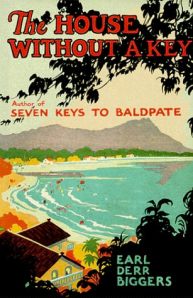 by itself, I’m counting it…
by itself, I’m counting it…
The House Without A Key was first published as a serial in 1925, released in novel form a little later. Author Earl Derr Biggers had already received a good deal of success with his play Seven Keys to Baldpate (which will always be imortalised for me as the Pete Walker schlocker House of the Long Shadows starring Peter Cushing, Vincent Price, and Christopher Lee). House Without A Key would introduce the world to Honolulu based detective, the erudite Chinese fellow, Charlie Chan.
The old black and white Charlie Chan films were something of a staple of my youth, regularly re-run on British television in the 1980s. Chan was a rotund chap with a thin moustache, an erratic manner of speach and a succession of assistants in the form of his children. It wasn’t unusual for my father to refer to me and my brother as “number 1 son” and “number 2 son” a la Chan.
I spotted the Wordsworth edition of the first three Chan novels, A Charlie Chan Omnibus whilst on a trip to London a few months ago in that favourite haunt of mine, Lovejoys on the Charing Cross Road. I’ve been picking up the Wordsworth reprints of classic mysterious literature whenever I can, and the opportunity to visit this icon from my past was too hard to resist.
There’s a notion from some quarters that books like this are actually in some way an endorsement of racial stereotyping, but to reduce to such shorthand is to brush aside a genuinely fascinating body of literature. Chan’s success is in spite of the perceptions which are manafest in the novel itself – the white Bostonians, who are visiting Honolulu when the murder at the centre of this novel is committed, are convinced that this Chinese man will not be any good, but like Columbo he plays to people’s perceptions as a way of sneaking out the truth.
Chan doesn’t appear for the first third of the novel, but from that point on he is increasingly important, showing an awareness of subtle clues which would rival the great Sherlock Holmes. Something about his appearance expanding to become the lead character in future novels finds resonance in the ascent of Peter Sellers as Inspector Clouseau in the Pink Panther movies.
Hawaii at the turn of the centre is exciting and mysterious and deeply attractive. The issues of class and family secrets find echoes in British custom of the same period, and are not unfamiliar today. That this is the first of 6 Chan novels makes it rather important, and it certainly grips. Only in the closing pages as the subplot about a young man’s love for just about every pretty young (white) thing he meets reaches its zenith does my attention wane.
The story – John Quincy is a Bostonian who has come to Hawaii to bring his wayward Aunt Minerva back home, only to discover that his cousin Dan has been murdered. Quincy soon finds himself teaming up with top detective Charlie Chan in pursuit of the murderer, whilst at the same time falling in love with Hawaii himself and resolving to move to San Francisco.
Buy The Charlie Chan Omnibus in the UK (containing the first 3 Chan novels) here.
But The House Without A Key in the US here.
Avalard’s 999 Challenge countdown
(a quick reminder of my challenge, and the current tally of entries)
1. 9 different interpretations of Sherlock Holmes
2. 9 instalments of “Avalard’s Box of Obfuscation” podcast
3. 9 novels 1 down, 8 to go
4. 9 Hitchcock films
5. 9 films at the cinema 2 down, 6 to go
6. 9 Michael Caine films
7. 9 classic Britcom television series
8. 9 British horror films
9. 9 episodes of the Avengers
